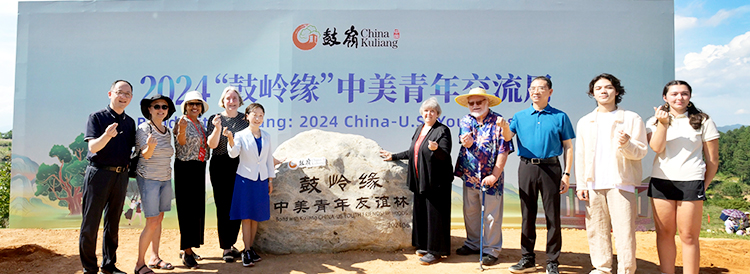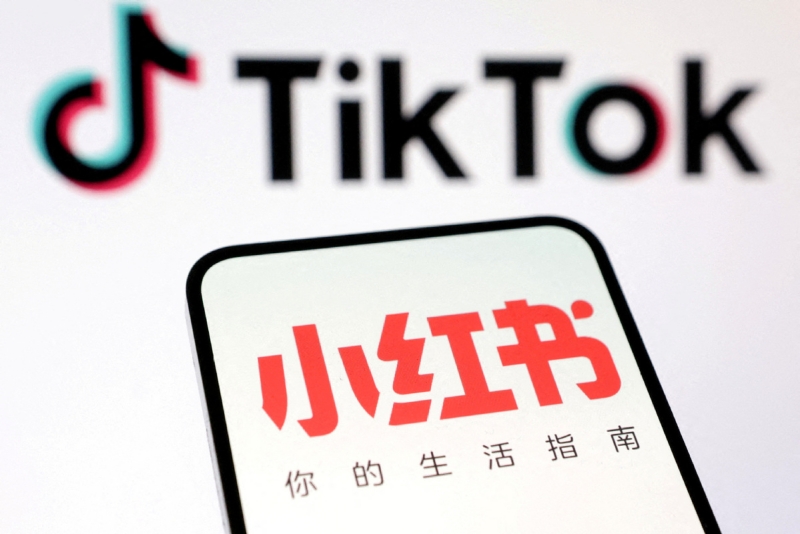


The logos for TikTok and RedNote, known in China as Xiaohongshu, are seen in this illustration taken Jan 15, 2025. [Photo/Agencies]
American talk show host Jimmy Fallon humorously remarked, "Americans would literally rather learn Mandarin than use Instagram Reels!" Recently, more than 700,000 users who call themselves "TikTok refugees" from the United States flocked to a popular Chinese social media app named RedNote (or Xiaohongshu). This unexpected "migration" has connected netizens from the two great nations like never before.
In a lighted-hearted way, they were asked on RedNote to pay "cat tax" (sharing photos of their cats as a greeting gesture). Some American users took the opportunity to ask for help with their Chinese language homework. In the comment sections of numerous posts, Chinese and American users engaged in lively discussions, explaining their lifestyles and debunking long-standing stereotypes. One American user posted a photo captioned, "Me reuniting with my Chinese spy,”"poking fun at the U.S. Government's alleged concerns about TikTok being used as a surveillance tool.
This unexpected exchange improved mutual understanding between ordinary Chinese and Americans, opened a window into each other's worlds, and brought to light a diverse range of perspectives. Beyond these interactions, American netizens are also captivated by content about China's local delicacies, scenic rural villages, and wonderful cultural events.
RedNote has become a window into the real China and a new avenue for cultural exchange. Fun interactions like this are great. But it is only a beginning in promoting mutual understanding between two countries that are as distinct from each other as China and the U.S.
China has long demonstrated its commitment to openness and inclusiveness. By simplifying visa application processes and optimising payment systems, it continuously facilitates the flow of people, trade, and tourism. For instance, China now offers unilateral visa-free policies of a 30-day validity period for citizens from 38 countries, creating unprecedented opportunities for business professionals, students, and families to experience Chinese culture firsthand.
Additionally, citizens of 54 countries can enjoy visa-free transit for up to 10 days, allowing them to leisurely experience China's history, culture, and nature. These policies are not merely administrative gestures – they embody the ancient Chinese wisdom of Hexie (harmony), inviting the global community for sharing and growing together.
Looking back, Sino-American people-to-people exchanges have a rich history. From 1909 to 1937, the Boxer Indemnity Scholarship funded about 1300 Chinese students studying in the U.S. After the founding of the People's Republic of China, exchanges such as ping-pong diplomacy and the Obama-era 100,000 Strong Initiative further strengthened ties. "Bond with Kuliang," Sino-U.S. Bridge Program, and the Flying Tigers Photo Exhibition etc. have all successfully deepened mutual understanding, especially among the young in both nations.
In the past decade, bilateral relations between the two countries had some ups and downs. As China continues to rise on the global stage, some people in the U.S. increasingly struggle with a bruised ego. They try to paint China as a threat, abuse state power to suppress China's technology advancement, and restricts exchanges between the two peoples. In his book Destined for War: Can America and China Escape Thucydides' Trap?, Harvard political scientist Graham Allison suggests that conflict is often inevitable when a rising power challenges the dominance of an established one. But is this inevitable? Perhaps, if a zero-sum mindset prevails.
China offers a different perspective. Despite barriers put up by the U.S. such as visa restrictions, harassment of Chinese students, and restricted air travel, President Xi Jinping announced in 2023 that China would invite 50,000 young Americans to participate in exchange and study programs over the next five years. Last year, nearly 15,000 from all 50 states and D.C. visited China under this initiative.
People-to-people exchanges should not be stifled under the pretext of national security or ideology. In fact, they cannot be stifled – as is seen with "TikTok refugees." No matter how complex politics becomes, the people will always find a way to be connected.
Zhong Ling is a China-based commentator on international affairs.
The article was first published on Pearls & Irritations on Feb 13, 2025.
